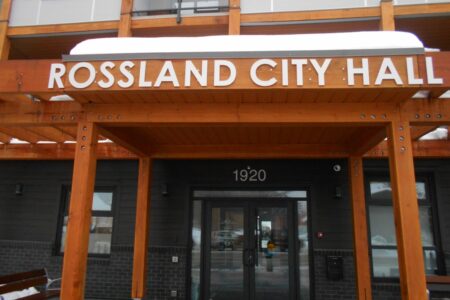GF council in hot water at regular meeting
Last Tuesday’s council meeting got more than a little heated when Grand Forks residents packed the meeting room at Roxul. Citizens had more than a few questions to ask councillors about the proposed water metres.
The room was packed, with people spilling out into the hallway, and most of them were their to show solidarity for a petition that they presented to council, with others wanting to question council on their decisions.
Frank Triveri was the official delegation on the meeting’s agenda and he stressed his concern over how the motion for water metres was passed, saying he wanted a more democratic process. He presented a petition to council that had over 500 signatures.
“We found – pardon the pun — very little thirst in the community for meters,” he said. “This is approximately half the number of voters in the last municipal election.” He went on to say that they were able to get that many signatures in just two weeks and that still others had not been able to sign but had made their feelings known to Triveri.
The petition asked that the council rescind their motion until they were able to further consult with the public and to put off installing the water metres until 2015.
Triveri asked council to hold more town hall meetings and to carefully weigh the pros and cons of going this route. He also wanted water metres to be a campaign issue for the coming municipal election.
“Let the citizens of Grand Forks make the decision,” he told council. He said that the petition signees felt that council made a “closed door decision” and that it is a hidden tax or money grab. Other concerns included what would happen in the future like potential rate increases and possible privatization.
Triveri said that he there are mostly seniors on his street and that the town has a largely aging population. He doesn’t see how the average consumption in Grand Forks could be over 700 litres per person, per day.
“How much of that water is reaching those houses through broken infrastructure?” he asked, suggesting that the high water volume could be due to aging, leaky pipes and other infrastructure that the city needs to update.
Triveri said he would sit on a public committee about water metres if the city council would put the subject to a referendum.
Julia Butler was one of many individuals who stepped up to the podium to ask some questions. One of her concerns was regarding rate increases.
She told city council that the suggested rates would leave the city at a loss and that the rates would have to go up over the years. She also said that – to her understanding – the cities of Kamloops, Rossland and Cranbrook put the water metre question to a referendum.
Mayor Brian Taylor said that in those examples, the city would have been borrowing money but Grand Forks is looking to use federal gas tax money for the project, which is projected to cost $1.3 million.
The next speaker had concerns about the statistics and questioned whether Grand Forks’ water usage took into consideration the drier climate. The following speaker told council they were being bribed with federal money, to which Taylor jokingly replied that they were always being bribed with federal money. However, he went on to explain that communities that don’t follow good water management are often left at the bottom of the list when it comes to applying for future funding.
Another speaker said that his street is losing water pressure and the speaker after that asked detailed questions regarding how many water metres would be installed and the cost per unit. There will be 1800 to 2000 metres installed but the City won’t know the cost of each metre until the project is put out to tender.
At this point, Taylor tried to limit the amount of questions that people were asking but the current speaker refused to leave the podium.
“No,” he said. “I’m a taxpayer and you are a servant to these people.”
Taylor replied saying he was chairing this meeting and he was asking him to sit down. “We have limited questions and you are abusing your position.”
Tension increased in the room and after a few minutes Taylor announced he was going to adjourn the meeting.
They had a break and then Taylor called the meeting back to order with Triveri back at the podium.
Triveri recapped what he wanted to state.
“I just don’t like the idea of using water as a commodity,” he said. “Are you going to cut off water if they don’t pay their water bill?”
Coun. Neil Krog took the opportunity to praise the group that had brought the petition in, citing it as the best petition he had ever seen. He said that he understands the concerns but questions some of the validity and he wished he had been able to talk to them first.
“Some (of this) I’m not buying into,” he said, going on to state that he is also a citizen, that he pays for water and that the city council is not part of a greater conspiracy as some earlier speakers had suggested.
He also said that the motion wasn’t passed behind council doors and that the there have been public meetings in the past. He gave the example of a meeting in 2011 that specifically said it was to address the pros and cons of water metres. He also reminded the room that the subject of water metres has been on the table since 1999 and that all regular council meetings are open to the public.
Coun. Michael Wirischagin agreed that it was the best petition that he had ever seen and he wanted to get the room the answer they had come for.
“I believe that every individual here as well as every individual that signed the petition deserves an answer so they don’t have to be strung along any further,” he said.
He read the motion from the petition which asked the council to “put a moratorium or halt on the universal water and metre program including installation of water metres pending further dialogue with the community.”
After the motion was read, Taylor called twice for someone to second the motion but no one did, meaning that the motion would not go forward.
This left the audience disgruntled and they made comments like “see you at election time” but Triveri told the council “We disagree with your decision but it’s your right to make the decision. We live in a democratic society.” He stressed to council that they consult with the public when they make any further decisions regarding the water metres.
In the morning…
While the conversation ended on Tuesday with the motion not going through, the discussion had actually started much earlier in the day during a committee of the whole meeting.
Manager of Development and Engineering Sasha Bird made a presentation along with Chief Administrative Officer (CAO) Doug Allin regarding the proposed water metres and an open house that was held on Jan. 22 on the subject.
Bird said that the meeting was well attended with over 100 people asking questions. The two most common questions were the rate structure and the cost involved for the project.
Bird and Allin recapped that the plan to install a water metre program was put in place on Nov. 12 last year and that water metres are already in use in the industrial, commercial, institutional and multi-family properties in town. That, said Bird, has been in place for over a decade.
Allin talked about the consultants and experts that the city has worked with and that all of their recommendations are towards water metering, especially with regards to conserving water.
He gave the example of Port Elgin, Ontario (pop. 6500) that installed water metres. The project cost them $500,000 but it saved them multiple millions of dollars because they didn’t have to get a new water treatment plant, said Allin. Bird added that they also reduced water consumption by 15 per cent.
Installation of the water metres will happen in 2014, but billing will still be a few years away. In 2015, they will start a “mock billing” system, where individuals will see what their bill would be if they were really getting charged. This is meant to give residents a chance to alter their water use and the city will also be able to talk to the public about any concerns they have with their bills.
Allin told the room that there had been an error in one publication that said the water metres would be installed in 2015, but that they would actually be installed in 2014. He said all the other documents say 2014.
Throughout the process, the City will work with a public committee to work out the kinks. In 2016, council will decide if they want to start actual billing or if they want to defer it for another year. Allin said it will be up to the council at the time.
While the City plans on using gas tax funds for the project, they are also applying for a grant that they should hear about in April. Allin is optimistic because they made a good application but says there are never any guarantees with grants.
After Bird and Allin finished their report, Graham Watt, the project coordinator for the Kettle River Watershed Management Plan, addressed council.
“I appreciate the business and operational perspective,” he said, referring to how the water metres are expected to save the City money. “An additional aspect is that this watershed is over allocated. The ground water supplies are stressed.”
He went on to explain that residents rely on ground water as do the fish in the river. He said that he supports the water metres and that “we need to do everything we can to look at water conservation measures that are available to us.”
At this point, the public started quizzing city council. Several of audience members came up to the podium to ask their questions. They said they didn’t believe that the average person in Grand Forks was using 720 litres of water a day compared to British Columbia’s 426 litres per day. They challenged the statistics, asking if that took into consideration factors like the smaller population, climate and the size of yards. Council was told that the statistics were like comparing apples to oranges.
Coun. Cher Wyers referred the audience to statistics from the Columbia Basin Trust that can be found online.
Again audience members stressed that they would have preferred a debate before the decision was made and that they had no time to react to the reports.
Wirischagin said that he is not in favour of a universal application of water meters, but that he does support water metres. He asked city staff questions that he had received from the public. One was whether the metres would be installed in the houses or at property lines.
Allin answered saying that both are possible and that it is possible to opt out of not having a water metre, but the bill would be a guess and the resident would be paying a significantly higher amount for water than necessary.
Wirischagin said that he was also asked who pays for the installation and Allin said it was all part the installation process and that the work would be done by a finished carpenter.
In response to accusations that this had all be done behind closed doors Allin said that all the information has been posted on their website, on the agenda boards at City Hall and that the reports are available in all the public council meetings.
“This cannot be discussed in-camera,” he said. “They’ve been available all the way along.”
Even former municipal treasurer Christine Thompson stood up and said that the water metres were always out in the public. She also said that she is happy the project is coming to fruition.
“Why should residents who conserve water be paying for the service the same as those who use an excess amount of water?” she said. “I am looking forward to having one installed and paying for the service that’s provided.”
Another audience member compared city council’s actions to fishing, saying that they were putting bait out to the public before they hook them and reel them in.
After several other voices were heard, the petition was first initially presented to council. Allin said they could submit the petition now as information to the council, or they could go through a formal submission process to make the petition official. It was handed to Taylor and he was told that “these are voices that can’t be disregarded.”
Taylor and the other councillors decided to move on from the topic because the water metres were on their regular council meeting’s agenda for later that day.

























